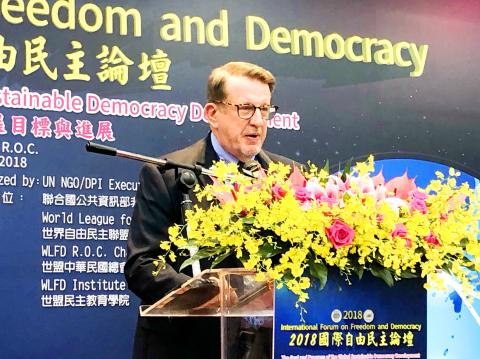Human rights issues should never be put to a vote, a visiting human rights advocate said yesterday, adding that the passage of three referendums on LGBT rights on Nov. 24 was comparable to laws passed in Nazi Germany.
In his opening address at the International Forum on Freedom and Democracy in Taipei, Bruce Knotts, executive director of the Unitarian Universalist Association’s UN office, a non-governmental organization (NGO), said that such issues “should never be put to a vote as Taiwan has just done with regard to same-sex couples.”
The Constitution guarantees the rights of same-sex couples to marriage equality, but Protestant Christian churches in Taiwan organized referendums in opposition to an interpretation issued by the Council of Grand Justices, Knotts said.

Photo: Lu Yi-hsuan, Taipei Times
“This is called democracy because it asks for a democratic process to rule on whether a group of people should enjoy equal protection under the law or not?” he asked, adding that in 1930s Germany, the Nuremberg Laws that stripped citizens identified as Jewish of their civil rights were also passed by a parliamentary vote.
“The road to the death camps started with the trappings of populist democracy,” he said.
Knotts’ remarks came after Taiwanese voted on four questions related to LGBT rights, including a question defending the Civil Code’s definition of marriage as being between a man and a woman, which was backed by 72.5 percent of voters who cast a ballot, while another on protecting the rights of same-sex couples through legislation other than amendments to marriage laws in the Civil Code passed with 61.1 percent support.
The third question, against including homosexuality in gender education at schools, was supported by 67.4 percent of ballots cast.
Two other proposals, submitted by LGBT rights advocates, were rejected by similarly large margins.
Those two proposals called for the Civil Code to be amended to allow same-sex marriage and for the inclusion of education on gender equality, including subjects related to homosexuality, in school curriculums.
The council in May last year ruled that the definition of marriage in the Civil Code was unconstitutional and ordered that legislation be passed within two years to allow marriage between “two people,” not just a man and a woman.
If such regulations are not enacted within two years, same-sex couples are to be allowed to marry under the law by the same process as laid out in the Civil Code, the council said.
The one-day forum was organized by the World League for Freedom and Democracy.
The league is a Taipei-based international non-governmental organization that evolved from the Anti-Communist League and was initiated by Taiwan, South Korea and the Philippines in 1954.
It was renamed in 1990 in an effort to adjust to “global political realities and to attract more people to the freedom and democracy movement.”

The manufacture of the remaining 28 M1A2T Abrams tanks Taiwan purchased from the US has recently been completed, and they are expected to be delivered within the next one to two months, a source said yesterday. The Ministry of National Defense is arranging cargo ships to transport the tanks to Taiwan as soon as possible, said the source, who is familiar with the matter. The estimated arrival time ranges from late this month to early next month, the source said. The 28 Abrams tanks make up the third and final batch of a total of 108 tanks, valued at about NT$40.5 billion

A group from the Taiwanese Designers in Australia association yesterday represented Taiwan at the Midsumma Pride March in Melbourne. The march, held in the St. Kilda suburb, is the city’s largest LGBTQIA+ parade and the flagship event of the annual Midsumma Festival. It attracted more than 45,000 spectators who supported the 400 groups and 10,000 marchers that participated this year, the association said. Taiwanese Designers said they organized a team to march for Taiwan this year, joining politicians, government agencies, professionals and community organizations in showing support for LGBTQIA+ people and diverse communities. As the first country in Asia to legalize same-sex

Travel agencies in Taiwan are working to secure alternative flights for travelers bound for New Zealand for the Lunar New Year holiday, as Air New Zealand workers are set to strike next week. The airline said that it has confirmed that the planned industrial action by its international wide-body cabin crew would go ahead on Thursday and Friday next week. While the Auckland-based carrier pledged to take reasonable measures to mitigate the impact of the workers’ strike, an Air New Zealand flight arriving at Taipei from Auckland on Thursday and another flight departing from Taipei for Auckland on Saturday would have to

MOTIVES QUESTIONED The PLA considers Xi’s policies toward Taiwan to be driven by personal considerations rather than military assessment, the Epoch Times reports Chinese President Xi Jinping’s (習近平) latest purge of the Chinese People’s Liberation Army (PLA) leadership might have been prompted by the military’s opposition to plans of invading Taiwan, the Epoch Times said. The Chinese military opposes waging war against Taiwan by a large consensus, putting it at odds with Xi’s vision, the Falun Gong-affiliated daily said in a report on Thursday, citing anonymous sources with insight into the PLA’s inner workings. The opposition is not the opinion of a few generals, but a widely shared view among the PLA cadre, the Epoch Times cited them as saying. “Chinese forces know full well that